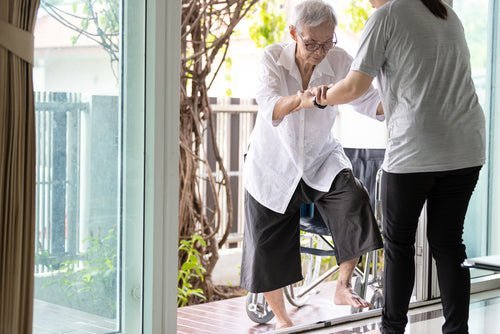
Balance problems in the elderly: What causes it and how to help
Ageing is a gift, but it can also come with many new challenges. Balance issues are one of the most common problems that elderly people face.
Balance problems can lead to a higher risk of falls and injuries, affecting the overall quality of life. This often discourages many older people from venturing outside of the house.
At Millercare, we understand how important it is to take back control of your life. In this blog, we will discuss what causes balance problems and ways to overcome them.
The Common Causes of Balance Issues in The Elderly
There are various changes that our body goes through as we age which have a direct effect on our balance. This includes a reduction in muscle mass and strength, decreased flexibility, and slower reflexes.
A reduction in the number of nerve cells in the inner ear and a decrease in the flexibility of membranes can lead to a diminished response to balance signals. This leads to dizziness and unsteadiness.
Age-related vision problems, such as macular degeneration, glaucoma, and cataracts, impair depth perception and spatial awareness, leading to balance issues.
A lack of physical activity can lead to weakened muscles and health deterioration, which also affects our balance as we age.
Medical Conditions Which Affect Balance
Certain medical conditions besides typical ageing can affect balance in older people. This includes:
- Inner ear disorders: Conditions like vertigo or Meniere's disease can lead to dizziness and balance problems.
- Neurological disorders: Parkinson’s disease and multiple sclerosis can impair balance due to their effects on movement and coordination.
- Arthritis: Joint inflammation, particularly in weight-bearing joints like the knees and hips, can lead to instability.
- Stroke or mini-stroke: These conditions often affect the part of the brain that controls balance and coordination.
Signs and Symptoms of Balance Problems
Various signs and symptoms can point to whether you or someone you know is dealing with an illness or issue that is affecting their balance. This includes:
- Dizziness or vertigo
- Frequent falls
- Difficulty focusing your vision
- Concentration issues
- Tinnitus
- Nausea or vomiting
- Hearing loss
- Fatigue
- Altered walking pattern
- Slower reaction time
Preventive Measures and Lifestyle Changes
Balance problems can take a huge toll on our overall well-being and mental health. It's important to reduce isolation for the elderly as physical activity and socialisation are beneficial for good health.
1. Regular Physical Activity
Exercise which focuses on strengthening the legs and muscles, is a great way to overcome balance issues. This includes practicing elderly-friendly yoga and tai chi. Our exercise support and equipment are ideal for getting started.
Regular walks are beneficial to add to your daily routine. This also encourages time in nature and socialising with others.
2. Dietary changes
Eating a balanced diet rich in calcium and vitamin D can help strengthen bones and prevent osteoporosis, which affects balance.
Regular hydration is not only needed for healthy and functioning organs; it is essential to avoid lightheadedness.
3. Home Safety Modifications
There are various things you can implement in the home to help with balance. Install handrails and grab bars on your stairs, in the bathroom, and anywhere you struggle with balance.
Install adequate lighting in all areas of the home to improve vision and de-clutter your space to avoid tripping.
4. Footwear and Clothing
Wearing protective shoes with good support and non-slip soles is a great way to prevent slipping. These also provide pain relief for those who suffer from arthritis and leg pain.
Avoid wearing loose clothing that drags on the floor, as this provides a great tripping hazard.
5. Regular Health Check-Ups
Health check-ups are essential for everyone, no matter your age.
However, if you are an elderly individual suffering from balance issues, consulting a professional as soon as possible can help identify the issue and receive the appropriate care.
Certain medications can affect balance, so it’s best to have them reviewed regularly by a doctor. This includes sedatives, tranquillisers, and some blood pressure drugs.
6. Mental Health and Cognitive Exercises
It often goes unmentioned how stress and anxiety can have a large effect on our overall health, including our balance.
Engaging in activities that reduce stress, whatever this may be for you, can improve your bodily function.
Cognitive exercises, such as reading, writing, and puzzles, can also help our brain function better and provide mental stimulation.
Walking Aids at Millercare
At Millercare, we aim to help customers find relief and joy in the ageing process, restoring quality of life and independence.
Our wide range of walking aids can help you take one step closer to achieving this. If balance issues are affecting your everyday life, you can invest in a walking frame or mobility walker today. Everyone deserves a little help, and you can rely on our walking aids to assist you the minute you step out of the house.